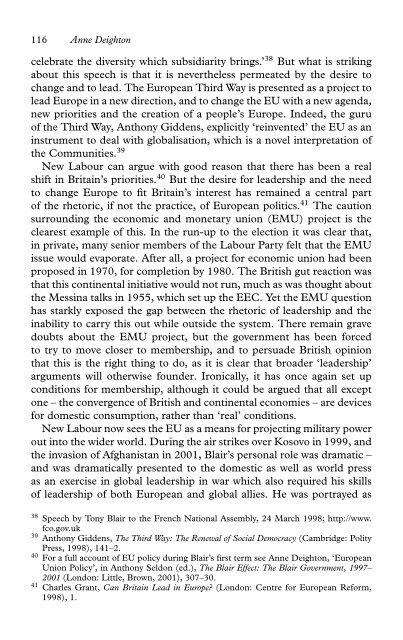Memory and Power in Post-War Europe: Studies in the Presence of ...
Memory and Power in Post-War Europe: Studies in the Presence of ...
Memory and Power in Post-War Europe: Studies in the Presence of ...
You also want an ePaper? Increase the reach of your titles
YUMPU automatically turns print PDFs into web optimized ePapers that Google loves.
116 Anne Deighton<br />
celebrate <strong>the</strong> diversity which subsidiarity br<strong>in</strong>gs.’ 38 But what is strik<strong>in</strong>g<br />
about this speech is that it is never<strong>the</strong>less permeated by <strong>the</strong> desire to<br />
change <strong>and</strong> to lead. The <strong>Europe</strong>an Third Way is presented as a project to<br />
lead <strong>Europe</strong> <strong>in</strong> a new direction, <strong>and</strong> to change <strong>the</strong> EU with a new agenda,<br />
new priorities <strong>and</strong> <strong>the</strong> creation <strong>of</strong> a people’s <strong>Europe</strong>. Indeed, <strong>the</strong> guru<br />
<strong>of</strong> <strong>the</strong> Third Way, Anthony Giddens, explicitly ‘re<strong>in</strong>vented’ <strong>the</strong> EU as an<br />
<strong>in</strong>strument to deal with globalisation, which is a novel <strong>in</strong>terpretation <strong>of</strong><br />
<strong>the</strong> Communities. 39<br />
New Labour can argue with good reason that <strong>the</strong>re has been a real<br />
shift <strong>in</strong> Brita<strong>in</strong>’s priorities. 40 But <strong>the</strong> desire for leadership <strong>and</strong> <strong>the</strong> need<br />
to change <strong>Europe</strong> to fit Brita<strong>in</strong>’s <strong>in</strong>terest has rema<strong>in</strong>ed a central part<br />
<strong>of</strong> <strong>the</strong> rhetoric, if not <strong>the</strong> practice, <strong>of</strong> <strong>Europe</strong>an politics. 41 The caution<br />
surround<strong>in</strong>g <strong>the</strong> economic <strong>and</strong> monetary union (EMU) project is <strong>the</strong><br />
clearest example <strong>of</strong> this. In <strong>the</strong> run-up to <strong>the</strong> election it was clear that,<br />
<strong>in</strong> private, many senior members <strong>of</strong> <strong>the</strong> Labour Party felt that <strong>the</strong> EMU<br />
issue would evaporate. After all, a project for economic union had been<br />
proposed <strong>in</strong> 1970, for completion by 1980. The British gut reaction was<br />
that this cont<strong>in</strong>ental <strong>in</strong>itiative would not run, much as was thought about<br />
<strong>the</strong> Mess<strong>in</strong>a talks <strong>in</strong> 1955, which set up <strong>the</strong> EEC. Yet <strong>the</strong> EMU question<br />
has starkly exposed <strong>the</strong> gap between <strong>the</strong> rhetoric <strong>of</strong> leadership <strong>and</strong> <strong>the</strong><br />
<strong>in</strong>ability to carry this out while outside <strong>the</strong> system. There rema<strong>in</strong> grave<br />
doubts about <strong>the</strong> EMU project, but <strong>the</strong> government has been forced<br />
to try to move closer to membership, <strong>and</strong> to persuade British op<strong>in</strong>ion<br />
that this is <strong>the</strong> right th<strong>in</strong>g to do, as it is clear that broader ‘leadership’<br />
arguments will o<strong>the</strong>rwise founder. Ironically, it has once aga<strong>in</strong> set up<br />
conditions for membership, although it could be argued that all except<br />
one – <strong>the</strong> convergence <strong>of</strong> British <strong>and</strong> cont<strong>in</strong>ental economies – are devices<br />
for domestic consumption, ra<strong>the</strong>r than ‘real’ conditions.<br />
New Labour now sees <strong>the</strong> EU as a means for project<strong>in</strong>g military power<br />
out <strong>in</strong>to <strong>the</strong> wider world. Dur<strong>in</strong>g <strong>the</strong> air strikes over Kosovo <strong>in</strong> 1999, <strong>and</strong><br />
<strong>the</strong> <strong>in</strong>vasion <strong>of</strong> Afghanistan <strong>in</strong> 2001, Blair’s personal role was dramatic –<br />
<strong>and</strong> was dramatically presented to <strong>the</strong> domestic as well as world press<br />
as an exercise <strong>in</strong> global leadership <strong>in</strong> war which also required his skills<br />
<strong>of</strong> leadership <strong>of</strong> both <strong>Europe</strong>an <strong>and</strong> global allies. He was portrayed as<br />
38 Speech by Tony Blair to <strong>the</strong> French National Assembly, 24 March 1998; http://www.<br />
fco.gov.uk<br />
39 Anthony Giddens, The Third Way: The Renewal <strong>of</strong> Social Democracy (Cambridge: Polity<br />
Press, 1998), 141–2.<br />
40 For a full account <strong>of</strong> EU policy dur<strong>in</strong>g Blair’s first term see Anne Deighton, ‘<strong>Europe</strong>an<br />
Union Policy’, <strong>in</strong> Anthony Seldon (ed.), The Blair Effect: The Blair Government, 1997–<br />
2001 (London: Little, Brown, 2001), 307–30.<br />
41 Charles Grant, Can Brita<strong>in</strong> Lead <strong>in</strong> <strong>Europe</strong>? (London: Centre for <strong>Europe</strong>an Reform,<br />
1998), 1.
















